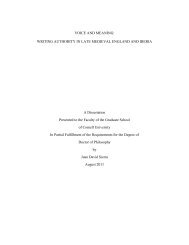Briana Anderson - Cornell University
Briana Anderson - Cornell University
Briana Anderson - Cornell University
You also want an ePaper? Increase the reach of your titles
YUMPU automatically turns print PDFs into web optimized ePapers that Google loves.
5<br />
they have received benefits from each other), and communal relationship (both parties<br />
provide benefits to each other because they are concerned for the welfare of the other).<br />
Research has demonstrated that credible sources have a positive impact on<br />
attitudes toward both an advertisement and the brand. Atkin and Block (1983) found<br />
that celebrity endorsers (versus similar non-celebrity endorsers) were perceived as<br />
more trustworthy, competent (expertise), and more attractive in alcohol advertising.<br />
Moreover, the source credibility ratings of the endorsers extended to the message and<br />
products. In another study, Goldberg and Hartwick, (1990) - testing Fishbein and<br />
Azjen’s (1975) source credibility framework that posits that source credibility affects<br />
the probability that a message claim will be accepted - manipulated levels of advertiser<br />
(i.e. corporate) expertise and trustworthiness and claim extremity on a rank order scale<br />
of product brands. Goldberg and Hartwick (1990) found that corporate credibility<br />
moderated evaluations of ad credibility and product evaluation, that is, higher<br />
corporate credibility led to more positive evaluations of ad credibility and product.<br />
Corporate Social Responsibility<br />
One way organizations seek to improve relationships with their stakeholders is<br />
by engaging in corporate social responsibility (CSR) initiatives and activities. The<br />
definitions of corporate social responsibility are plentiful, generally indicating that<br />
corporations operate within social norms and encompass activities aimed at creating a<br />
safe and supportive work environment for employees, operating in a manner conscious<br />
of impact on outside environment, and contributing to the health of society in general<br />
(Seitel, 1995). In academic literature, CSR has been conceptualized as pro-social<br />
corporate endeavors designed to improve relations with company stakeholders<br />
(Murray & Vogel, 1997), corporate social performance (Turban & Greening 1997), to<br />
a more socially proactive view of long-term goals related to CSR as part of a dynamic<br />
social system (McGee 1998). Further researchers have conceptualized CSR as a

















